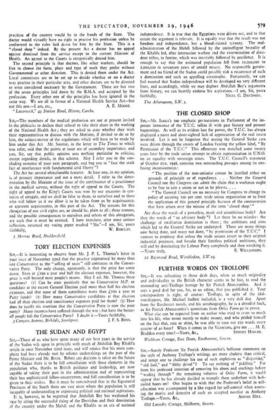SIR,—The members of the medical profession are not at present
invited in the plebiscite to declare their refusal to take their share in the working of the National Health Act ; they are asked to state whether they wish their representatives to discuss with the Minister, if invited to do so by him, the subject-matter of the regulations which will have to be made by him under this Act. Mr. Souttar, in the letter to The Times to which you refer, said that the points at issue are of secondary importance, and you, Sir, say that public opinion sees nothing particular to criticise, except regarding details, in this scheme. May I refer you to the con- cluding sentence of your next paragraph, and beg you to "face the stark fact of interference with fundamental civil liberty "?
The Act hat several objectionable features. At least one, in my opinion, is of primary importance and not a mere detail. I refer to the deter- mination by the Minister of the issue of the continuance of a practitioner in the medical service, without the right of appeal to the Courts. The right of appeal to the King's Courts was won by our ancestors in cen- turies of struggle, and we shall be false to them, to ourselves and to those who will follow us if we allow it to be taken from us by acquiescence, or apparent acquiescence, in this part of the Act. The reasons for this abrogation of our, civil rights are, or should be, plain to all ; these reasons, and the possible consequences to ourselves and others of this abrogation, are such that it must be resisted. I have therefore, after most serious reflection, returned my voting paper marked "No."—I am, Sir, yours
5 Murray Road, Huddersfield.


































 Previous page
Previous page